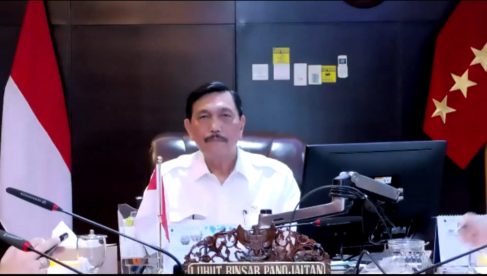General Lecture, Master’s in Management, FEB UI, “Indonesia Bounces Back”
Nino Eka Putra ~ FEB UI Public Relations Officer
DEPOK – (18/9/2020) The Master’s in Management Program at FEB UI (MM FEB UI) held a general lecture through a webinar that took “Indonesia Bounces Back” as its theme on Friday (18/9/2020). The event featured Coordinating Minister for Maratime Affairs and Investment Gen. (Ret) Luhut Binsar Pandjaitan, M.P.A. as speaker and was moderated by Prof. Rofikoh Rokhim, Ph.D., head of the Master’s in Management Program, FEB UI. UI Rector Prof. Ari Kuncoro, Ph.D. closed the webinar with a remark.
Luhut said that the number of tests and the tightening of the health protocols during the Covid-19 pandemic were evidence of improvements in Indonesia’s ability to control the pandemic. Measures taken to curb the spread of the virus have caused a decline in the aggregate demand due to declining people’s activities and aggregate production capability as producers have to reduce plant utilization.

As a result, Indonesia’s economy slowed in Q2-2020, although still relatively in better shape than other countries. The six sectors most affected by the Covid-19 pandemic are management, wholesale and retail traders, construction, mining and extration, transportation and warehousing, accomodation and food and beverages.
The National Economic Recovery (NEC) is designed to focus on three aspects, namely health to deal with Covid-19, social assistance to help people affected by the pandemic, and economic stimulus to help the private sector and MSMEs recover. A total of Rp695.2 triliun or ~6.35% of the gross domestic product (GDP) was allocated for the NEC program.
“The government’s strategy to drive investment to help Indonesia recover is focused on the infrastructure sector. Investment is also aimed at maintaining the previous reform and debottlenecking investment constraints, pushing the passing of the Omnibus Bill into law, and support for businesses affected by Covid-19. Invesment for good fiscal management as buffer and extraordinary policies in extraordinary times,” said Luhut.
Luhut added that practical policies on business to business (B2B) investment are classified into four categories, namely environmentally friendly, which means compliance with environmental law and regulations and regional and global environmental standards. In other words, sustainable development. Second, industry value added, which means Indonesia will prioritize investors who are willing to give added value to Indonesia in processing rich raw/mineral resources. Third, training of local manpower, which means we expect investors to train local workers so that they can play a key role in the future. Fourth, transfer of technology, an important factor in invesment and, of no less importance, assistance to develop the capacity of local communities.
“Going forward, to improve the investment climate, the government will focus on several policies, including pushing the passing of the omnibus bill into law and downstreaming policies to increase the added value of Indonesia’s natural resources, including nickel, coal, and crude palm oil (CPO). To that end, the government collaborates with investors to ensure technology transfer,” Luhut said at the end of his presentation.

In his closing remark, UI Rector Ari Kuncoro expressed appreciation to Luhut for sharing insights with MM FEB UI students. Ari said, “Uncertainty is the pressing issue today and it requires coordination to achieve optimum results that will in turn increase the effectiveness of a policy. It’s not an easy thing to do as it involves numerous stakeholders. This means we must recognize the timeline, when this condition, which is called a terminal condition, will end. This will give economic players and policymakers hope and positive expections and enable them to predict when the curent condition will end. This momentum could be a very good opportunity to measure our ability, which was hidden in normal conditions,” Ari concluded. (hjtp)






